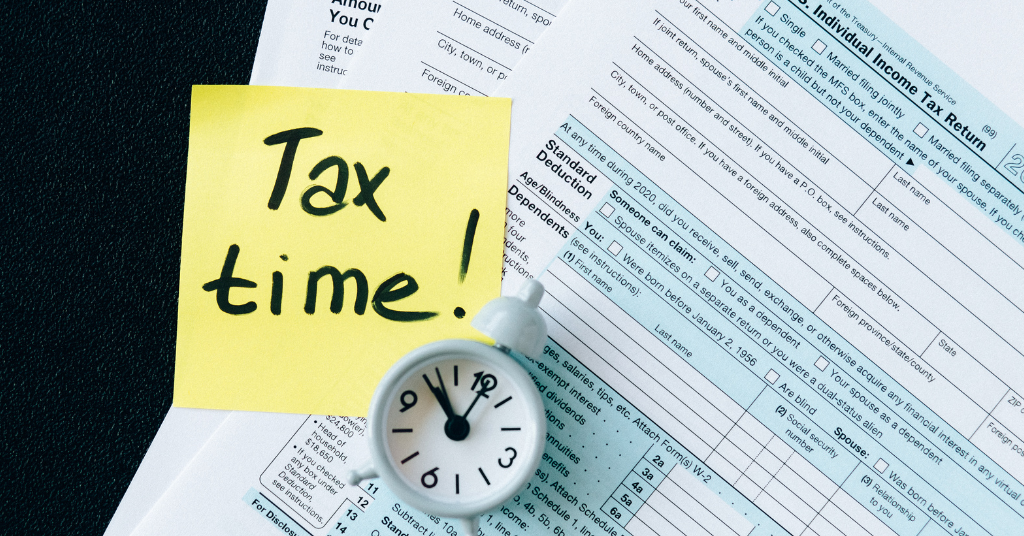

Maximize Your 2024 Refund: Tax Breaks You Might Be Missing
Category: Accounting
It can be hard to know where to begin when it comes to personal financial planning.
As individuals, we are all unique, and that means our financial goals are different, too. You may dream of buying a house, of retiring early, starting your own business, saving to pay for higher education…or all of the above!
Whatever your financial goals may be, achieving them means having a plan — which can seem daunting in and of itself! It’s often difficult to prioritize the different aspects of one’s financial future and understand how they relate to decisions made in the present.
It’s difficult balancing short-term necessities, like paying bills, with long-term planning, weighing wants and needs in the present and future, making sure you’re prepared for unexpected events, and minimizing your tax liability, all at the same time. It’s no wonder so many people neglect to be thorough about their personal financial planning!
It doesn’t have to feel so overwhelming. By implementing these financial planning tips, you can set yourself up for success in your finances, both today and tomorrow.
In this post, I’ll discuss three areas in which you can start taking immediate action to create an efficient and effective personal financial plan:
To take control of pursuing and achieving your financial goals starting today, read on.


Personal finance encompasses more than just your checking and savings accounts. It also involves things like your credit cards, loans, investments, insurance, mortgages, retirement plans, social security, taxes, and more — as well as the way you manage and organize all of the above. Budget, savings, spending, and preparation for future risks and events are all a part of personal finance.
That means an excellent personal finance plan needs to account for all of these factors and more. A good financial plan is essentially a roadmap: a means to define your needs and goals and a clear route to work towards them over time within the constraints of your circumstances.
Given this, the importance of good financial planning should be self-explanatory. Quite simply, if you want to fulfill your financial goals, you need a plan.
Having said that, all financial plans are not created equal, and you will need to tailor yours to your individual situation and needs. The good news is that some general principles are likely to apply to almost anyone.
To understand how to approach thinking about your unique plan, let’s start by taking a look at:
If the past two years have contained any lesson, it’s this: all you can count on is change. However, a realistic, focused budget can help you take control of your spending and saving and provide yourself a financial cushion for when the unexpected occurs.
As it will.
To develop your budget every month, it’s often a good idea to start with a wider perspective.
If you can determine your long-term goals, be they buying a house or retiring with a certain amount of savings, you can work backward to determine how much you’ll need to save each month to get there.
Remember, to ensure your savings are there when you want them, it’s also essential to build an emergency fund. The exact size of your emergency fund can vary based on your obligations, needs, and other factors, but a good rule of thumb is to save enough to cover your daily expenses for six months. Again, once you determine what that amount is, you can back into the smaller amount you’ll have to save each week.
Next, identify monthly outflows such as living expenses. To create a buffer for yourself, estimate high for these figures and low for your monthly income. You should also factor in occasional large purchases, like a new car or even that entertainment system you’ve had your eye on. It’s not an irresponsible purchase if it’s part of your financial plan!
Additionally, be sure to consider debt management when developing your budget. Make sure you allocate funds to pay down your existing debt and be aware of interest rates. It’s often a good idea to first focus on paying down debts with the highest interest rates while making minimum payments on other accounts.
Finally, be realistic when making your budget. Be sure to include discretionary expenses and budget for fun! You’re not a machine, and there’s nothing wrong with earmarking some money for a fancy dinner or tickets to the big game. After all, that’s part of what a budget is for.
Once you put your budget into effect, be sure to keep track of how it’s working. Are you coming up short on your monthly savings? Spending more than you anticipated on groceries each week? Or did you get a big bonus and need to factor it in? No problem. Just keep your eye on those long-term goals, and work backward to the present circumstances to determine how to proceed.
That leads us to the subject of:
You’ve already factored long-term savings into your budget. Now it’s time to think about ways to boost your savings by helping your money grow. You can accomplish this with various tools, from a simple savings account that accrues interest to stocks or mutual funds that can increase in value.
The easiest way to meet your savings goals is to “set it and forget it.” Online banking offers plenty of options for automatic transfers and deposits. So if your budget calls for you to put 15% of each paycheck into your retirement account? Just set it up to happen automatically. You’ll most likely never even notice the money is gone, but your future self will thank you for it.
Another way to grow your savings in the short term is with a Certificate of Deposit (CD). This type of savings account holds a fixed amount of money for a fixed period of time with an interest rate that is typically higher than that of a regular savings account. When you redeem your CD after the set amount of time, you receive the money you deposited initially plus any interest it has accrued.
To save over the long-term, you may want to consider…
Some people feel intimidated by the idea of investing, but it can be as simple as contributing to a 401(k). Other tax-advantaged investment accounts include Traditional or Roth IRAs or 529 college savings plans.
Stocks, bonds, money markets, mutual funds, commodities, real estate, and options are the most common types of investments. Most financial professionals will recommend diversifying an investment portfolio across the different spectrum of assets.
It is also essential that you know the risks involved with any investment. Some of these risks include:
Finally, no personal financial plan would be complete without considering…
The tax code can seem impenetrably complex to the average person. To make things even more confusing, the last few years have seen pieces of legislation such as the Tax Cuts and Jobs Act, the American Rescue Plan, and the recent bipartisan infrastructure bill impact tax law in profound ways. With the Build Back Better Act still working its way through Congress, there may be more changes yet to come.
However, the bottom line is that there are still plenty of approaches you can use to maximize your tax breaks, even if you aren’t an expert. For example, keeping your receipts and tracking your expenditures can go a long way towards taking advantage of more deductions or tax credits to leave less money on the table.
Increasing your retirement account contributions or putting money into a Health Savings Account (HSA) can also provide some relief at tax time. Improving your home’s energy efficiency or buying an electric-powered vehicle can additionally make you eligible for additional tax credits.
Finally, to ensure you can enjoy the maximum possible benefits, it may be a good idea to consult a tax professional. As always, Rosenberg & Chesnov stand ready to assist you with trusted counsel and expertise.
If you are a client and would like to book a consultation, call us at +1 (212) 382-3939 or contact us here to set up a time.
If you aren’t a client, why not? We can take care of your accounting, bookkeeping, tax, and CFO needs so that you don’t have to worry about any of them. Interested? Contact us here to set up a no-obligation consultation.
Interested in receiving updates in your mailbox? Check out our newsletter, full of information you can use. It comes out once every two weeks, and you can register for it below.


Category: Accounting


Category: Accounting


Category: Accounting
Send us a message and we will contact you as soon as possible.
Jeff Coyle, CPA, Partner of Rosenberg Chesnov, has been with the firm since 2015. He joined the firm after 20 years of business and accounting experience where he learned the value of accurate reporting, using financial information as a basis for good business decisions and the importance of accounting for management.
He is a diligent financial professional, able to manage the details and turn them into relevant business leading information. He has a strong financial background in construction, technology, consulting services and risk management. He also knows what it takes to create organizations having built teams, grown companies and designed processes for financial analysis and reporting.
His business experience includes:
Creating and preparing financial reporting, budgeting and forecasting.
Planning and preparation of GAAP and other basis financial statements.
Providing insight on financial results and providing advice based on those results.
Jeff also has a long history of helping individuals manage their taxes and plan their finances including:
Income tax planning and strategy.
Filing quarterly and annual taxes.
Audit support.
General financial and planning advice.
Prior to joining the firm in 2015, Jeff was in the private sector where he held senior financial and management positions including Controller and Chief Financial Officer. He has experience across industries, including construction, technology and professional services which gives him a deep understanding of business.
Jeff graduated from Montclair State University, he is a CPA and member of the American Institute of Certified Public Accountants, New York State Society of Certified Public Accountants and New Jersey State Society of Public Accountants.
Jody H. Chesnov, CPA, Managing Partner of Rosenberg Chesnov, has been with the firm since 2004. After a career of public accounting and general management, Jody knows the value of good financials. Clarity, decision making, and strategy all start with the facts – Jody has been revealing the facts and turning them into good business results for more than three decades.
He takes a pragmatic approach to accounting, finance and business. His work has supported many companies on their path to growth, including helping them find investors, manage scaling and overcome hurdles. His experience and passion for business reach beyond accounting and he helps businesses focus on what the numbers mean organizationally, operationally and financially.
He has a particular expertise in early-stage growth companies. His strengths lie in cutting through the noise to come up with useful, out of the box, solutions that support clients in building their businesses and realizing their larger visions.
Prior to joining the firm in 2004, Jody was in the private sector where he held senior financial and management positions including General Manager, Chief Financial Officer and Controller. He has experience across industries, which gives him a deep understanding of business.
Jody graduated with a BBA in Accounting from Baruch College, he is a CPA and member of the American Institute of Certified Public Accountants and New York State Society of Certified Public Accountants.
In addition to delivering above and beyond accounting results, Jody is a member of the NYSCPA’s Emerging Tech Entrepreneurial Committee (ETEC), Private Equity and Venture Capital Committee and Family Office Committee.
He is an angel investor through the Westchester Angels, and has served as an advisor for many startup companies and as a mentor through the Founders Institute.